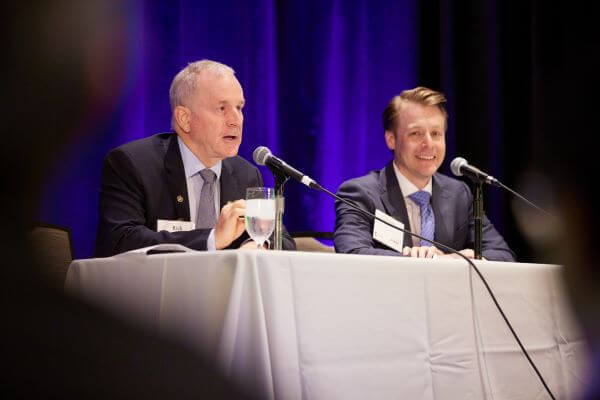
Rounding out a weekend of business meetings and educational sessions aimed at navigating modern health care challenges, the Texas Medical Association’s inaugural Business of Medicine conference concluded with the tradition of an update of medicine’s hard-fought wins during the legislative session and what those wins mean for the practice of medicine.
Led by TMA Chief Lobbyist Clayton Stewart and TMA President Rick Snyder, MD, the discussion delved into defensive victories against several bills that would have allowed scope-of-practice expansion, advanced questionable health plan practices, and reduced physician and patient protections, among other harmful additions.
“Quality care comes through science, education, and advocacy,” Dr. Snyder said during the event. “And out of those three, advocacy is the most important.”
At the onset of the 2023 legislative session, TMA's Council on Legislation deliberated a set of top-10 legislative priorities critical to protecting patient care. Guided by that list, TMA delivered wins in each area amid a record-breaking number of health-care related bills filed this session.
“This is the first time that the Council on Legislation created a priority list of legislative issues from a consensus of TMA members and staff,” Mr. Stewart said. “But we know the many issues medicine faces. We will continue to address those and other [issues] moving forward.”
Arguably, TMA’s greatest achievement this session was the total strike down of any legislation that would have expanded scope of practice for nonphysician practitioners, TMA’s top priority.
The closing presentation included a highlight reel of one of those quintessential victories – the shutdown of House Bill 2553 in the final vote on the bill – showcasing TMA’s strong relationships with pro-medicine allies in the legislature and sending a strong message on the importance of physician-led care.
Amid cheers from the conference audience, attendees witnessed firsthand testimony by medical advocates responsible for TMA's total victory against scope expansion.
“This was our plan of attack and how we killed scope of practice on the house floor,” Mr. Stewart said.
TMA also fought for and won increased funding for residency training programs, women’s health, and public health.
But just because the session is over “doesn't mean that the lobbying and the advocacy is over,” Dr. Snyder cautioned, reminding physicians that legislators need their help to serve Texas patients and urging doctors to stay involved in their local districts.
Meanwhile, TMA will remain vigilant on these and unresolved issues likely to pop up in future sessions. “As clinicians, we treat one patient at a time. But as a physician-advocate, we can treat a whole county, state, and country all at once,” Dr. Snyder said.
Interested in becoming advocates themselves, physician audience members peppered both speakers with questions on what legislative issues TMA will focus on next session and how to speak to lawmakers about TMA priorities.
“Thank you, TMA, for standing up for physicians and standing up for the practice of medicine,” one attendee said against a backdrop of resounding applause.
Joseph Valenti, MD, vice-chair of the TMA Board of Trustees reminded the audience that advocacy also includes getting involved in TEXPAC.
Physicians also can attend TMA’s Leadership Summit Jan. 25-27 in Austin for the opportunity to learn more about TMA advocacy and grow as trusted figures in their practice, organization, and community. Save the date and read Texas Medicine Today for program updates and developments in weeks to come.
Alisa Pierce
Reporter, Division of Communications and Marketing
(512) 370-1469